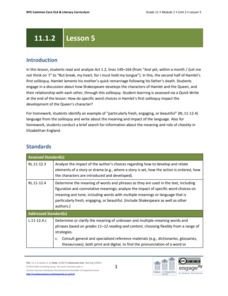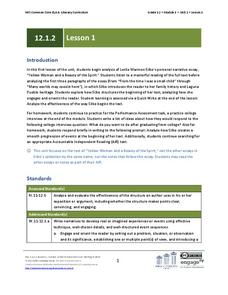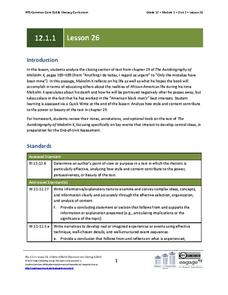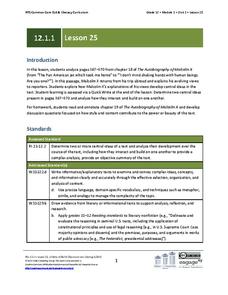EngageNY
Grade 11 ELA Module 1: Unit 2, Lesson 5
Scholars delve into Act 1.2 of Shakespeare's Hamlet. By completing a writing exercise and participating in a class discussion, they continue to analyze how the author develops the characters in the play.
EngageNY
Grade 11 ELA Module 1: Unit 2, Lesson 10
To write an essay or not to write an essay—that is the question! Scholars complete a mid-unit assessment based on their study of Hamlet. They write essays analyzing how Shakespeare develops Hamlet's character about other characters.
EngageNY
Grade 11 ELA Module 1: Unit 3, Lesson 5
There's a fine line between madness and genius. Using the resource, scholars complete a mid-unit assessment based on their study of Virginia Woolf's A Room of One's Own. They write a multi-paragraph response, analyzing how two central...
EngageNY
Grade 11 ELA Module 2: Unit 1, Lesson 5
I have an idea! Scholars examine closely how Du Bois develops a central idea in paragraph four of the chapter "Of Our Spiritual Strivings." They also begin finding significant and relevant evidence to support a topic and complete...
EngageNY
Building Background Knowledge: Small-Group Work to Learn More about the History of Wars in Vietnam
Scholars take a close look at "The Vietnam Wars." They answer questions and discuss in groups to conclude that the author respects the Vietnamese. They participate in a modified jigsaw discussion and end the exercise with a quick writing...
EngageNY
Analyzing Text Structure & Summarizing Text: “Equal Rights for Women” by Shirley Chisholm
Let me check my schedule! Scholars set up discussion appointments with five classmates to discuss Shirley Chisholm's speech "Equal Rights for Women." Readers then use their Note Catcher guides to analyze the text of the speech more...
California Education Partners
Follow the Water by Arthur Dorros
Assess scholars' reading and writing capabilities with an exam that challenges learners to respond to an informative text. Through note-taking and peer discussion, pupils analyze a passage from the story, Follow the Water from Brook to...
EngageNY
Analyzing the Author’s Perspective: “The Shakespeare Shakedown”
Simon Schama's article "The Shakespeare Shakedown" allows young writers to see how authors respond to conflicting viewpoints. Class members participate in discussion appointments with five peers to explore the author's point of view.
EngageNY
Analyzing Events: Carlotta’s Journey
How does one talk silently? Class members participate in a silent communication activity known as a Chalk Talk. During the activity, they answer text-dependent questions analyzing Carlotta’s Journey. They use markers and chart paper to...
EngageNY
Grade 12 ELA Module 1, Unit 2, Lesson 1
As part of a study of narrative writing, class members analyze how Leslie Marmon Silko structures the beginning and orients and engages readers in her narrative, "Yellow Woman and a Beauty of the Spirit."
EngageNY
Grade 12 ELA Module 1: Unit 1, Lesson 28
After discussing Haley's techniques in his conclusion of The Autobiography of Malcolm X, class time is devoted to drafting, sharing, and getting feedback on writers' college essays.
EngageNY
Grade 12 ELA Module 1, Unit 2, Lesson 3
How does an author sequence events in a narrative so that the events build on one another and create a tone of mystery, growth, or resolution? As part of a study of narrative writing, class members work in pairs to examine the techniques...
EngageNY
Grade 12 ELA Module 1: Unit 1, Lesson 26
Readers use their annotations and questions about chapter 19 of The Autobiography of Malcolm X to guide their discussion of the final chapter of the text.
EngageNY
Grade 12 ELA Module 1: Unit 1, Lesson 25
Class members return to the discussion of The Autobiography of Malcolm X using the questions they developed and their annotated notes of the events in chapter 17.
EngageNY
Grade 12 ELA Module 1: Unit 1, Lesson 23
Malcolm X's journey to Cairo, his Hajj, his Letter from Mecca detailing his insights into "true Islam," and his transition to Al-Hajj Malik El-Shabazz are the focus of the discussion of chapter 17 of The Autobiography of Malcolm X.
EngageNY
Grade 12 ELA Module 1: Unit 1, Lesson 11
Chapter 10 of Malcolm X's Autobiography introduces readers to Elijah Muhammad's teachings. Discussion questions focusing on syntax and diction draw attention to how Malcolm X's perspective on Mr. Muhammad changes.
Other popular searches
- English Language Skills
- Pragmatic Language Skills
- Expressive Language Skills
- Oral Language Skills
- Language Skills Lesson Plans
- English Language Arts Skills
- Early Literacy Oral Language
- Functional Language Skills
- Social Language Skills
- Studying Latin Language
- Basic Language Skills
- Figurative Language Skills

















